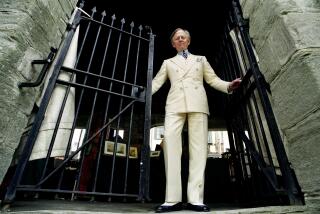One-Time Pornographer and Aide to Trotsky : Comedic Novelist Bernard Wolfe, 70
- Share via
Bernard Wolfe, a cynically comedic novelist who entered what he called the “House of Words” via the cellar of pornography, has died of a heart attack at the Motion Picture and Television Hospital.
Wolfe was 70 and was rushed to the Woodland Hills hospital after being stricken in his Bell Canyon home on Friday. He died there Sunday.
Secretary and bodyguard to Leon Trotsky, sailor with the Merchant Marine, ghost writer for entrepreneur Billy Rose and friend to Henry Miller--Wolfe had a career that, like his life, ranged from the halls of academia to the underworld of pornography, where he said he first learned to write to specified lengths while facing critical deadlines each working day.
In his “Memoirs of a Not Altogether Shy Pornographer,” Wolfe recalled with a jaded fondness his early years as an employee of a rare New York book dealer who dealt leather-bound volumes of literary filth under the table.
11 Novels in 11 Months
“In 11 months I wrote 11 novels and I acquired the work discipline of a professional writer, capable of a solid daily output.”
Wolfe had gone to Mexico after his 1936 graduation from Yale and had he worked as secretary to the exiled Trotsky. The events leading to the assassination of the Bolshevik leader formed the basis for his fourth and possibly best-known novel, “The Great Prince Died,” published in 1959. In it Wolfe renamed Trotsky “Victor Rostov” and placed him in a fortress near Mexico City where he and his followers are constantly guarded by police.
Wolfe painted a sympathetic Rostov, a man less haunted by the threat of assassination than by the guilt he carried for participating in the horrors of Stalinism.
Wolfe left Trotsky’s employ to join the Merchant Marine and then became editor of Mechanix Illustrated and ghost writer of Rose’s syndicated newspaper column “Pitching Horseshoes.”
In 1946, with Mezz Mezzrow, Wolfe wrote “Really the Blues,” a comical biography of a jazzman who operates as a con man. The novel was done as comedy satire, a pattern that Wolfe adhered to through most of his other novels and short stories.
Anti-War Novel Praised
In 1952 his science fiction work “Limbo” was published and was acclaimed as one of the first of the anti-war, anti-armaments postwar novels.
Among his other well-known titles are “Come On Out Daddy,” a look at how an idealistic writer copes with the financial lure and artistic peril of Hollywood; “The Magic of Their Singing,” a disparagement of nonconformity, and “Move Up, Dress Up, Drink Up, Burn Up,” a short story published in Playboy.
He also was the author of “Julie: The Life and Times of John Garfield,” and five uncollected short stories, two plays and several articles. He was the subject of a critical study by Carolyn Geduld in 1972 and taught writing at UCLA while doctoring scripts for Universal-International and 20th Century Fox.
Wolfe is survived by his wife, former film actress Delores Michaels, and twin daughters, Jordan and Miranda.
More to Read
Sign up for our Book Club newsletter
Get the latest news, events and more from the Los Angeles Times Book Club, and help us get L.A. reading and talking.
You may occasionally receive promotional content from the Los Angeles Times.










